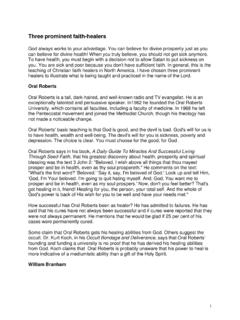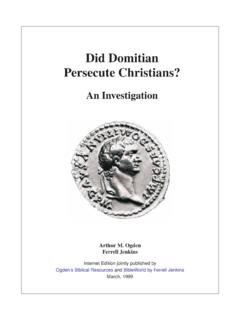Transcription of African Christianity - Reformed Reflections
1 Page 1 of 5 African Christianity African Christianity When I was a seminary student during the late fifties and early sixties, I had the opportunity to attend mission conferences in the Toronto area. Interestingly, the representatives of mission societies working in Africa usually gave the impression that the European and North American missionaries were the first ones who had arrived to proclaim the Gospel. According to J. Herbert Kane in Understanding Christian Missions (1986): " Christianity has made more converts in Black Africa than all the rest of the Third World combined. In spite of the fact that we got off to a late start in Africa as compared with Asia, we have made converts much faster. "No doubt Kane's "we" refers to "foreign missionaries" and not African Christians inclusive.
2 And these early missionaries tended to regard traditional African religions as evil, primitive, and superstitious. They extended this negative attitude toward African culture as a whole. The urgent predicament of the Church in Africa today is that of the apparent foreignness of Christianity . Many believe that Christianity cannot be traditionally African because it is supposed to be imported from Europe. In other words, if good ideas appeared in Africa, they must have come from the Western world. Thomas C. Oden, in his fascinating book, How Africa Shaped the Christian Mind: Rediscovering the African Seedbed of Western Christianity , notes that by a miscarriage of purpose the Church has succeeded in preaching and in teaching Africans about a strange God whom they somehow came to identify as the God of the white man.
3 African Christians were thus often put in the intolerable position of being obliged to turn their back on their own culture and heritage, and rely on imported European ideas. This served to reinforce the perception that Christianity was culturally alien to Africa. This led many Africans to resent Christianity and the West. They claim that "modern" Christianity brought only oppression. But interestingly, Islam does not get the same attention as Christianity . Yet Islam is younger than Christianity by six centuries. Before the 1960s, very few efforts were made to relate theology to the African context. Many Africans found that the presentation of Western issues in theology did not answer their inmost questions or solve some of the spiritual problems related to their African culture.
4 Western methods of thinking and learning were often unsuited to African ways. As a result, Christian theology was thought by many Christians to be something Western, rather than for the global Church. Thomas C. Oden's Critique Oden chastises contemporary African church leaders and theologians. He points out that African intellectual history has no need to be defensive or self-effacing. He notes that Africa taught Europe before Europe was prepared to teach Africa. Europe slept for many centuries without being fully aware of its vital intellectual sources in Africa. Without discrediting the sacrificial contribution of Western missionary efforts in spreading the Gospel in Africa, Oden's book, How Africa Shaped the Christian Mind, is a clarion call for a robust historical and theological reassessment of early African Christianity .
5 His central argument is that intellectual developments within early African Christianity shaped world Christianity in decisive ways. Contrary to entrenched views among Western scholars, the flow of intellectual leadership in the first five centuries of Christianity moved largely from Africa to Europe south to north. Page 2 of 5 African Christianity Oden's well-documented research shows that basic strands of both Eastern and Western traditions of Christianity including spiritual formation through monastic discipline, the European university, Christian dogma, and exegetical rules and methods had therefore their roots in ancient African Christian life. Early African Christianity Regrettably, some scholars of African culture and religion have acquired a persistent habit of assuming that Christianity began in Africa only a couple of centuries ago.
6 But Christianity is not a recent arrival in Africa. The historical fact is that Christianity came to Africa before it came to Europe and North America. It is a dynamic world-wide faith that has been part of Africa for nearly twenty centuries. All the early forms of Christianity were present in the four billions of square miles of Egypt, Sudan, Ethiopia, Eritrea, Libya, Tunisia, Algeria and Morocco, and possibly further south than we know now. Even early written literature shows the presence of Christianity in North Africa. The oldest surviving document of North African Christianity records the trial of Christians which dates back to July 17, 180. It states that the accused have a box which they say contains The Books (the memoirs of the apostles and the writings of the prophets), and the letters of Paul, a righteous man.
7 The book of Acts tells us that the Gospel spread from Jerusalem to Judea and then to Samaria. This can be seen in the story of Philip who was told to witness to an African , an important Ethiopian government official (Acts 8:27-39). The gospel captured the hearts and minds of many Ethiopians. Today's Ethiopian Coptic Church claims that its apostolic tradition is about 1,650 years old. It goes back to the tradition that narrates how the Ethiopian king travelled to the Nile delta, sat under the teachings of the patriarch Athanasius, and became himself the first bishop of Ethiopia. Christianity was present all up and down the Nile in the 5th, 6th and 7th centuries, and continued to spread. Christians living in these areas recorded and told their history.
8 But European historians have gone on to proceed as if the great intellectual and literary textual traditions of the Nile Valley and the Maghreb did not even exist. Even if written records are not always available, traditional oral history still offers a fairly reliable history of events. It needs to be understood and studied by Africans far more than it has been by Euro-Americans. What happened to ancient African Christianity ? The Muslim invasions wiped out much of what the early Christians had achieved. But remnants did survive. Despite the seventh-century Muslim conquest of Egypt, the slow but eventually total Islamicization of Nubia (ancient region of S Egypt and N Sudan) and the thousand year isolation of Ethiopia, today the Coptic Church of Egypt together with the Ethiopian Orthodox Church, the Eritrean Orthodox Church and the Eastern Orthodox patriarchate of Alexandria still are living representatives of ancient African Christianity .
9 Christianity in Egypt Usually we don't think of Egypt as an African nation. But it is. Admittedly, Oden remarks, on the one hand there are some Egyptians who are sensitive about being viewed as Africans. On the other hand many black Africans understandably have deep resentments against the Page 3 of 5 African Christianity centuries of slave trade they view as stemming perennially from the North. Egyptian Christianity traces its roots to the evangelist Mark. According to the church historian, Eusebius, reflecting the traditions of his day (early fourth century), Mark first preached the gospel in Alexandria, and the Coptic Church claims an unbroken succession of patriarchs from that time to the present. It is generally believed that the first converts in Egypt were of Greek origin who lived mainly in the city of Alexandria.
10 Later the Gospel spread to the "Copts" or Egyptians of Hamitic origin. The active practice of monasticism began deep in Africa. It flowered less on the coast of Africa than on the inland deserts and rugged mountains. The monks went far into the desert precisely to find places where they would not be distracted. From at least the early fourth century, the monastic movement became an important feature of the life of the Egyptian church and has remained so throughout its history. While in Rome, the church father, Jerome (347-420), praised the ascetic life of monasticism. Wanting to learn more about it, he went first to Syria and then to Bethlehem, and then all the way to the Nile Valley to learn from Egyptian monastics.








